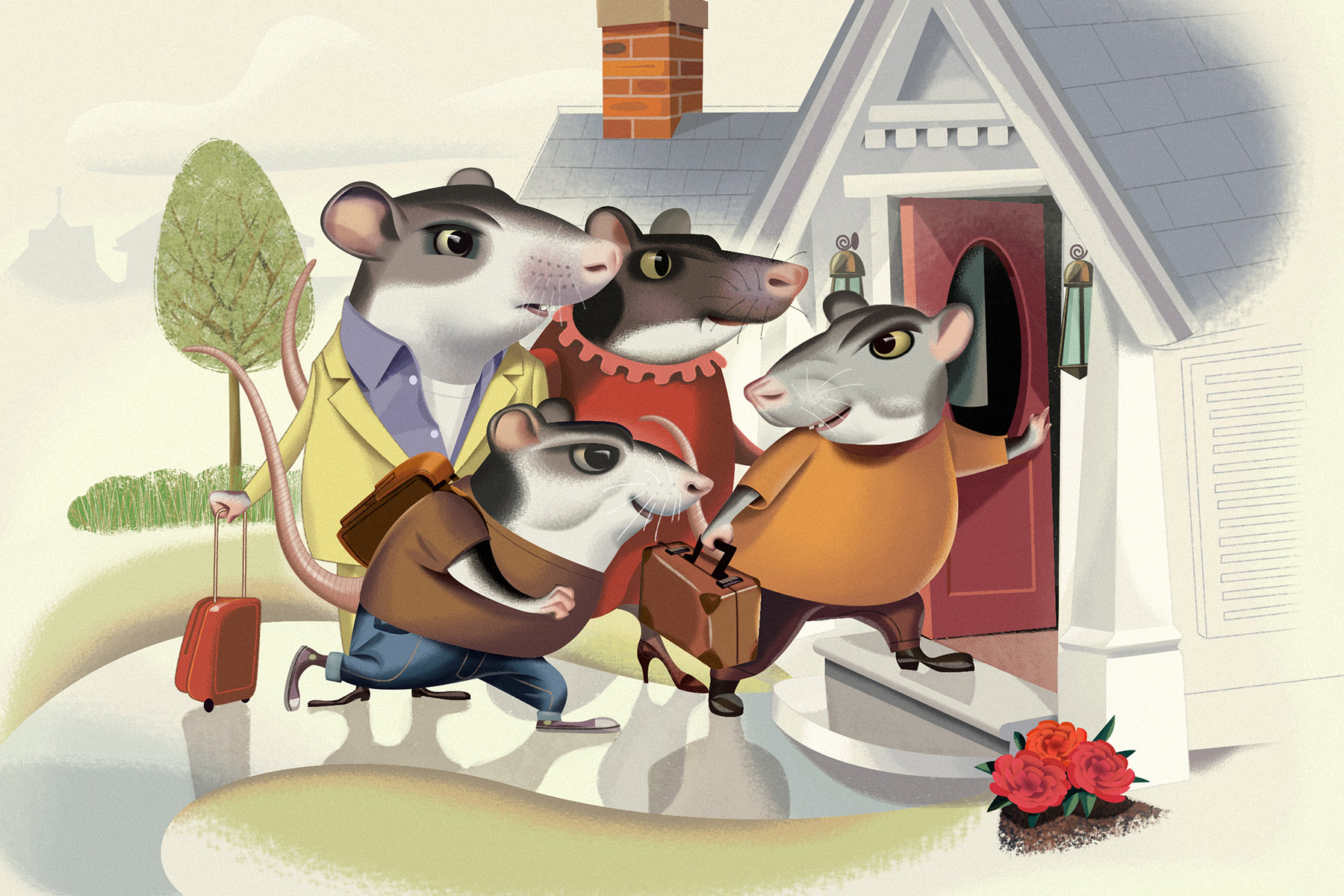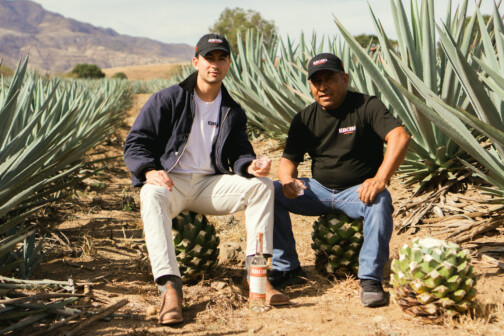On my last day in Dallas, as the movers played Tetris with my possessions, I walked around my suddenly empty house, making sure I didn’t leave anything behind. I found a couple things—a soccer ball collecting mold beneath the deck, a gently used ladder hiding out behind the garage. Otherwise, the property was bare, a neatly trimmed graveyard of memories I hoped I could resurrect if I ever returned.
I made one last sweep of the perimeter, looking for toys, and maybe tears, that had thus far eluded me. That’s when I noticed it: a small hole, hiding behind a tuft of monkey grass at the base of the house. I stuck my hand in it, hoping to feel it stop a few inches down. It kept going.
Leaving this house was never going to be easy. It was small by Dallas’ oversize standards, three cramped bedrooms spread across 2,000 square feet. It was old, too, built in the 1940s on a creaky pier-and-beam foundation. But the previous owner had converted it into a quirky, contemporary box, a little dollop of affordable funk in Lakewood Heights, the Land of Once and Future Knockdowns. Above all, the house was ours—the first home either my wife or I had ever owned, and the place we learned how to be married, to be parents, to be a family.
When we decided to sell, we assured our neighbors that we would try to find a suitable replacement. The neighbors wanted someone who would bring their costume A-game to the annual Halloween block party, where the boxed wine flows and Radio Flyers are expertly disguised as time-traveling DeLoreans and Top Gun fighter jets. I wanted someone who could replace me as coach of the Tietze Tigers, a position I’d resigned from in disgrace after failing to keep the infielders from brawling with each other over ground balls. Mostly, everyone just hoped they cared as much as we did.
The first offer that arrived seemed promising: a single mom relocating from California with her young son. Then the next offer came. They were a young couple who lived out of state and had no plans to leave. But her parents lived in Dallas, they said, so they needed a place to stay when they visited. They planned to be there often.
It wasn’t what we’d envisioned. But they offered more money, on top of other incentives. When we raised the idea of selling to the underbidding single mom, our real estate agent looked at us like we’d suggested burning the house down for the insurance money. She was right. This was business. We sold to the highest bidder, and now the house was theirs. I packed the hole with dirt one last time and drove away, hoping the new owners read that email we sent welcoming them to their new home.
A few weeks later, I was making plans for my family to return to Dallas for work. We could stay with friends on our old street, but we worried about confusing our already confused kids, who kept saying how much they missed their “regular house.” We could stay in a hotel, but wouldn’t that feel cold, padding around the downtown Marriott in a city full of neighborhoods that, after six years, we had come to know so well and love so much?
On a whim, I checked Airbnb for listings in East Dallas. That’s how you feel at home in a city, right? By parking in a stranger’s driveway, falling asleep with their TV flickering, rummaging through their kitchen cabinets in a frantic, shaky search for coffee filters? Isn’t it always the filters?
A listing caught my eye: a small, boxy contemporary listed under the heading, “LUXE LAKEWOOD SMART HOME NEXT TO EVERYTHING.” It was my house, available for $399 a night. My old three-bedroom house now somehow slept 14.
I felt betrayed. The buyer had never mentioned flipping the house into a short-term rental property. (It turned out to be their second Airbnb in Dallas.) More than that, I worried that my beloved former neighbors would blame me for the parade of bachelor party bros, Texas-OU fans, and Preston Hollow families slumming it while the contractor put the finishing touches on their au pair suites.
I texted a neighbor to ask whether anyone had rented it. “The Marriott could only wish to be so lucky,” he texted back.
No raucous house parties had broken out, but he was still unnerved by the constant presence of strangers on a block with dozens of young kids, especially with the host living three states away. People in cities across the globe are dealing with this phenomenon. Residents complain about noise, congestion, and other issues that arrive with tourists, party-chasers, and business travelers. Critics say Airbnb investors are tying up inventory, exacerbating housing shortages and inflating already unaffordable rents, further shutting poor people, especially people of color, out of our national urban renaissance.
Short-term rentals are technically illegal in New York, Los Angeles, and elsewhere. Other cities, including Austin, have enacted new rules. Dallas doesn’t regulate short-term rentals at all, and there are no immediate plans to, says Philip Kingston, the city councilman who represents my old neighborhood. (Like hotels, Airbnb skims occupancy tax from every transaction and sends it to the city.) He says he hopes market forces and common sense win out, but he knows they sometimes don’t. “If somebody’s an asshole and rents a house to 14 people in Lakewood Heights, that person sucks,” he told me.
After discovering the listing for my old house, I spent the evening scrolling through it. While I felt guilty for inviting chaos into my former neighbors’ Eden, the notion of people staying for a few nights in my former home did hold a certain appeal, like they were visitors in an interactive exhibit about my idyllic Dallas life. But the new owners had turned our former home into a house of horrific Texas clichés, almost satirical in its adherence to Airbnb’s faux-mod aesthetic. With every angry click, I wanted to reach through my laptop screen to rearrange, muss, and make the place feel lived in again.
The living room, for instance, looks comfortable enough as pictured, with its empty bookshelves and brooding contemporary furniture. But the couch should offer a better view of the living area, where the rabbi mourned our friend’s untimely death during shiva, and where, during a crowded summer bris, the mohel cut skin from my newborn son’s penis, eliciting screams that shook those piers and beams.
The kitchen does look bigger with the empty countertops. And I suppose the framed Texas flag may help guests remember where they are when they come home hammered from the Sam Hunt concert. But I wish it were still littered with half-full sippy cups and children’s art, piled on the counter in some parental purgatory, not good enough to be hung on a wall but not unmemorable enough to be quietly disappeared after lights out.
The downstairs guest room looks interesting stuffed with two double beds, especially because it’s not technically a bedroom. It would perhaps work better as a playroom, where renters might, say, sit cross-legged on the floor for years, building elaborate Magna-Tiles towers and the crooked, teetering foundation of a family’s life together.
Upstairs, the bedrooms look fine, even with two too many beds. But they’re missing the “lovies,” so many lovies, forming soft, colorful booby traps throughout the upstairs—Horsie and Cow-y and Piggie and Bull-y, Elmo and Grover and Big Bird and Ernie, spider monkey, howler monkey, Sulley, one of Sendak’s Wild Things, and that little orange goblin with the indistinguishable and probably inappropriate accent.
The outdoor spaces are, I admit, pretty LUXE. If I bought the house back tomorrow—it’s crossed my mind!—I’d probably insist on keeping that new beer bucket. It’s also probably true that the “private garage and drive fit up to 7 cars, yes 7!” That said, another option would be to limit it to a modest four cars and use the rest of the space for scooter races, chalk-drawing, or just standing in the dark, squeezing a few more minutes out of a night among friends.
As my trip approached, I kept coming back to Airbnb, and for a while I truly considered renting it, if only to test out that beer bucket. In the end, my work made the decision easy, offering to put us up at a hotel whose luxury trumped my cravings for nostalgia. Which was good, because I was a little worried about that hole.
Years ago, shortly after we moved in, we noticed that rats had taken to nesting beneath our house. Rodents are common in East Dallas, where garbage-strewn commercial strips and scores of home-construction sites conspire to send thirsty Norways skittering along fence lines and into cold, damp crawl spaces. We paid hundreds of dollars over the years to kill them and keep them out, and were mostly successful. But every once in a while, we’d hear a rumble under the house, go outside, and find a golf-ball-size tunnel leading below. We’d kill the rats, fill the hole, and move on. But eventually, the hole would return, just as it had the day we moved out. We mentioned the need for an exterminator in our email welcoming the new owners, but we never heard back.
I forgot about the hole after that. But when I landed back in Dallas, I drove to the neighborhood to say hi to neighbors. There was a truck in my old driveway, so I knocked on the door. A man answered. He was staying in the house while his was remodeled, he said. I asked if I could peek inside, and he said no, a little grumpily. When I asked about how it worked as an Airbnb, he launched into a sort of oral one-star review of the house itself, deriding it as old and not as sleek as advertised.
I couldn’t see the hole from where I was standing, in the driveway, and I didn’t mention it. I could have. Maybe I should have. But, no, Airbnb is about feeling at home. Better for him to discover it like we always did, late at night, when the kids were asleep and the dishes were clean and everything was quiet and still, and the foundation rumbled like there was a subway car passing below. The host may claim this house sleeps 14, but no one knows it better than I do: it sleeps a lot more than that.
I made one last sweep of the perimeter, looking for toys, and maybe tears, that had thus far eluded me. That’s when I noticed it: a small hole, hiding behind a tuft of monkey grass at the base of the house. I stuck my hand in it, hoping to feel it stop a few inches down. It kept going.
Leaving this house was never going to be easy. It was small by Dallas’ oversize standards, three cramped bedrooms spread across 2,000 square feet. It was old, too, built in the 1940s on a creaky pier-and-beam foundation. But the previous owner had converted it into a quirky, contemporary box, a little dollop of affordable funk in Lakewood Heights, the Land of Once and Future Knockdowns. Above all, the house was ours—the first home either my wife or I had ever owned, and the place we learned how to be married, to be parents, to be a family.
When we decided to sell, we assured our neighbors that we would try to find a suitable replacement. The neighbors wanted someone who would bring their costume A-game to the annual Halloween block party, where the boxed wine flows and Radio Flyers are expertly disguised as time-traveling DeLoreans and Top Gun fighter jets. I wanted someone who could replace me as coach of the Tietze Tigers, a position I’d resigned from in disgrace after failing to keep the infielders from brawling with each other over ground balls. Mostly, everyone just hoped they cared as much as we did.
The first offer that arrived seemed promising: a single mom relocating from California with her young son. Then the next offer came. They were a young couple who lived out of state and had no plans to leave. But her parents lived in Dallas, they said, so they needed a place to stay when they visited. They planned to be there often.
I worried that my beloved former neighbors would blame me for the parade of bachelor party bros, Texas-OU fans, and Preston Hollow families slumming it while the contractor put the finishing touches on their au pair suites.
It wasn’t what we’d envisioned. But they offered more money, on top of other incentives. When we raised the idea of selling to the underbidding single mom, our real estate agent looked at us like we’d suggested burning the house down for the insurance money. She was right. This was business. We sold to the highest bidder, and now the house was theirs. I packed the hole with dirt one last time and drove away, hoping the new owners read that email we sent welcoming them to their new home.
A few weeks later, I was making plans for my family to return to Dallas for work. We could stay with friends on our old street, but we worried about confusing our already confused kids, who kept saying how much they missed their “regular house.” We could stay in a hotel, but wouldn’t that feel cold, padding around the downtown Marriott in a city full of neighborhoods that, after six years, we had come to know so well and love so much?
On a whim, I checked Airbnb for listings in East Dallas. That’s how you feel at home in a city, right? By parking in a stranger’s driveway, falling asleep with their TV flickering, rummaging through their kitchen cabinets in a frantic, shaky search for coffee filters? Isn’t it always the filters?
A listing caught my eye: a small, boxy contemporary listed under the heading, “LUXE LAKEWOOD SMART HOME NEXT TO EVERYTHING.” It was my house, available for $399 a night. My old three-bedroom house now somehow slept 14.
I felt betrayed. The buyer had never mentioned flipping the house into a short-term rental property. (It turned out to be their second Airbnb in Dallas.) More than that, I worried that my beloved former neighbors would blame me for the parade of bachelor party bros, Texas-OU fans, and Preston Hollow families slumming it while the contractor put the finishing touches on their au pair suites.
I texted a neighbor to ask whether anyone had rented it. “The Marriott could only wish to be so lucky,” he texted back.
No raucous house parties had broken out, but he was still unnerved by the constant presence of strangers on a block with dozens of young kids, especially with the host living three states away. People in cities across the globe are dealing with this phenomenon. Residents complain about noise, congestion, and other issues that arrive with tourists, party-chasers, and business travelers. Critics say Airbnb investors are tying up inventory, exacerbating housing shortages and inflating already unaffordable rents, further shutting poor people, especially people of color, out of our national urban renaissance.
Short-term rentals are technically illegal in New York, Los Angeles, and elsewhere. Other cities, including Austin, have enacted new rules. Dallas doesn’t regulate short-term rentals at all, and there are no immediate plans to, says Philip Kingston, the city councilman who represents my old neighborhood. (Like hotels, Airbnb skims occupancy tax from every transaction and sends it to the city.) He says he hopes market forces and common sense win out, but he knows they sometimes don’t. “If somebody’s an asshole and rents a house to 14 people in Lakewood Heights, that person sucks,” he told me.
After discovering the listing for my old house, I spent the evening scrolling through it. While I felt guilty for inviting chaos into my former neighbors’ Eden, the notion of people staying for a few nights in my former home did hold a certain appeal, like they were visitors in an interactive exhibit about my idyllic Dallas life. But the new owners had turned our former home into a house of horrific Texas clichés, almost satirical in its adherence to Airbnb’s faux-mod aesthetic. With every angry click, I wanted to reach through my laptop screen to rearrange, muss, and make the place feel lived in again.
The living room, for instance, looks comfortable enough as pictured, with its empty bookshelves and brooding contemporary furniture. But the couch should offer a better view of the living area, where the rabbi mourned our friend’s untimely death during shiva, and where, during a crowded summer bris, the mohel cut skin from my newborn son’s penis, eliciting screams that shook those piers and beams.
The kitchen does look bigger with the empty countertops. And I suppose the framed Texas flag may help guests remember where they are when they come home hammered from the Sam Hunt concert. But I wish it were still littered with half-full sippy cups and children’s art, piled on the counter in some parental purgatory, not good enough to be hung on a wall but not unmemorable enough to be quietly disappeared after lights out.
The downstairs guest room looks interesting stuffed with two double beds, especially because it’s not technically a bedroom. It would perhaps work better as a playroom, where renters might, say, sit cross-legged on the floor for years, building elaborate Magna-Tiles towers and the crooked, teetering foundation of a family’s life together.
Upstairs, the bedrooms look fine, even with two too many beds. But they’re missing the “lovies,” so many lovies, forming soft, colorful booby traps throughout the upstairs—Horsie and Cow-y and Piggie and Bull-y, Elmo and Grover and Big Bird and Ernie, spider monkey, howler monkey, Sulley, one of Sendak’s Wild Things, and that little orange goblin with the indistinguishable and probably inappropriate accent.
The outdoor spaces are, I admit, pretty LUXE. If I bought the house back tomorrow—it’s crossed my mind!—I’d probably insist on keeping that new beer bucket. It’s also probably true that the “private garage and drive fit up to 7 cars, yes 7!” That said, another option would be to limit it to a modest four cars and use the rest of the space for scooter races, chalk-drawing, or just standing in the dark, squeezing a few more minutes out of a night among friends.
As my trip approached, I kept coming back to Airbnb, and for a while I truly considered renting it, if only to test out that beer bucket. In the end, my work made the decision easy, offering to put us up at a hotel whose luxury trumped my cravings for nostalgia. Which was good, because I was a little worried about that hole.
Years ago, shortly after we moved in, we noticed that rats had taken to nesting beneath our house. Rodents are common in East Dallas, where garbage-strewn commercial strips and scores of home-construction sites conspire to send thirsty Norways skittering along fence lines and into cold, damp crawl spaces. We paid hundreds of dollars over the years to kill them and keep them out, and were mostly successful. But every once in a while, we’d hear a rumble under the house, go outside, and find a golf-ball-size tunnel leading below. We’d kill the rats, fill the hole, and move on. But eventually, the hole would return, just as it had the day we moved out. We mentioned the need for an exterminator in our email welcoming the new owners, but we never heard back.
I forgot about the hole after that. But when I landed back in Dallas, I drove to the neighborhood to say hi to neighbors. There was a truck in my old driveway, so I knocked on the door. A man answered. He was staying in the house while his was remodeled, he said. I asked if I could peek inside, and he said no, a little grumpily. When I asked about how it worked as an Airbnb, he launched into a sort of oral one-star review of the house itself, deriding it as old and not as sleek as advertised.
I couldn’t see the hole from where I was standing, in the driveway, and I didn’t mention it. I could have. Maybe I should have. But, no, Airbnb is about feeling at home. Better for him to discover it like we always did, late at night, when the kids were asleep and the dishes were clean and everything was quiet and still, and the foundation rumbled like there was a subway car passing below. The host may claim this house sleeps 14, but no one knows it better than I do: it sleeps a lot more than that.







